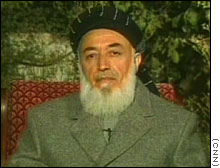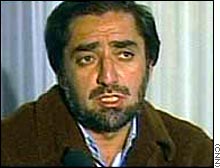|
returns to Kabul November 17, 2001 Posted: 7:54 PM EST (0054 GMT) KABUL, Afghanistan (CNN) -- Former Afghan president Burhanuddin Rabbani returned to the Afghan capital Saturday for the first time since he was deposed by the Taliban in 1996, said the Northern Alliance's foreign ministry. "I have not come here to extend my government, but I have come for peace and to prepare the ground for peace and to invite all Afghans and even outsiders who are working towards peace," he told reporters in a news conference following his arrival.
|

The United Nations still recognizes Rabbani as the president of Afghanistan. |
| Residents
in Kabul are concerned Rabbani's arrival could spark bitter ethnic infighting
among the Northern Alliance, which took control of the Afghan capital Tuesday.
Violence between rival warlords and former mujahedeen commanders, including those in the Northern Alliance, ravaged Kabul before the Taliban took control five years ago. Abdullah disputed reports of internal strife, saying the alliance, also known as the United Front, "represents the diversity of our society." "We have learned how to work together to get rid of the Taliban in the first place and to find a lasting settlement for Afghanistan," Abdullah said. The United Nations and the international community do not want the Northern Alliance to lead a post-Taliban government. Instead, they support a broad-based government. |

Northern Alliance Foreign Minister Abdullah Abdullah |